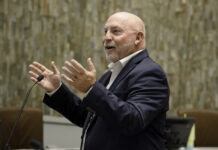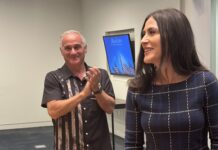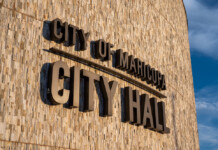
The multigenerational and aquatic center may be run by a third-party, nonprofit organization. Or, it could be several nonprofits working together. The Maricopa City Council couldn’t agree Tuesday on which was best.
Council members also disagreed over how specific the requirements for organizations applying to operate the center should be, which resulted in a lengthy, “spirited debate,” said Mayor Christian Price.
The issue was tabled so the council could have a work session to iron out the details on what a request for proposal should include.
For Price, the question was, “To what extent do we want these third parties involved?”
Council considered these guidelines Tuesday:
• The applying organization must be a single nonprofit entity or combination of such organizations.
• The partnership must not increase the amount of money the city needs to subsidize the center or result in residents needing to pay costly fees.
• The organization must be willing to integrate city groups in such a way that there’s no duplication of services.
• The organization must be willing to sign a shorter contract with extension options and the city will remain in control of pricing, programming and control.
“I think each one of these things is an incredible thing to dive into,” Price said. “And I’m not sure that in a 20-minute agenda item we’re going to be able to give staff such clear direction that when they leave here today, that they’re going to have the ability to say, ‘This is what council wants at each one of these items.’”
Price suggested having a two-hour work session “where we can go through each of these items systematically.”
Vice Mayor Ed Farrell disagreed.
“I think we can approve this thing tonight and I think staff can get clear direction of all items, with the exception of (the pricing), and we can make that real clear as well,” he said.
Councilman Leon Potter said, regardless of the proposal specifics, he wanted “to be sure that citizens, business owners, family members are at the table, that they’re OK with the agreement with the city.”
Farrell said that level of involvement was more appropriate for the actual contract negotiation stage, but “we’re not there yet.”
However, he said, the city should only accept requests for proposals from single nonprofits and not multiple groups working together to submit a single proposal.
Price said after watching videos of previous council discussions on the issue it was clear the council wanted proposals from groups of organizations as single entities. Discussion on who might run the multigenerational and aquatic center occurred before the new council was seated in June.
“When I went back to those videos, one of the things that was clearly delineated was that we wanted to see nonprofits,” Price said. “Not just one, but multiples. And in order to have multiples, it means we have to send out the (request for proposal) the right way.”
Councilwoman Julia Gusse agreed.
“These are great, but it’s so broad,” Gusse said. “It’s like me asking you to go out and get me a car and I’m not telling you what gas I want, what size I want, what color I want.”
She said the details were “essential for us to get right.”
Gusse also said she did not want local small business owners to be forced to compete with larger entities in the request-for-proposal process.
Farrell said during previous meetings he meant to send out a request for proposal to multiple, stand-alone nonprofit organizations.
“It was always the mindset of one nonprofit running the whole show,” Farrell said.
Councilman Marvin Brown agreed.
“If you continue to parse it out, it’ll be worse than trying to make sausage,” Brown said.
Farrell motioned to allow singular nonprofit entities to submit a proposal, but that motion failed with Farrell, Brown and Councilman Bridger Kimball voting for it and Price, Gusse and Potter opposed.

![City gave new manager big low-interest home loan City Manager Ben Bitter speaks during a Chamber of Commerce event at Global Water Resources on April 11, 2024. Bitter discussed the current state of economic development in Maricopa, as well as hinting at lowering property tax rates again. [Monica D. Spencer]](https://www.inmaricopa.com/wp-content/uploads/2024/04/spencer-041124-ben-bitter-chamber-property-taxes-web-218x150.jpg)
![3 things to know about the new city budget Vice Mayor Amber Liermann and Councilmember Eric Goettl review parts of the city's 2024 operational budget with Mayor Nancy Smith on April 24, 2024. [Monica D. Spencer]](https://www.inmaricopa.com/wp-content/uploads/2024/04/spencer-042424-preliminary-budget-meeting-web-218x150.jpg)




![Elena Trails releases home renderings An image of one of 56 elevation renderings submitted to Maricopa's planning department for the Elena Trails subdivison. The developer plans to construct 14 different floor plans, with four elevation styles per plan. [City of Maricopa]](https://www.inmaricopa.com/wp-content/uploads/2024/04/city-041724-elena-trails-rendering-218x150.jpg)
![Affordable apartments planned near ‘Restaurant Row’ A blue square highlights the area of the proposed affordable housing development and "Restaurant Row" sitting south of city hall and the Maricopa Police Department. Preliminary architectural drawings were not yet available. [City of Maricopa]](https://www.inmaricopa.com/wp-content/uploads/2024/04/041724-affordable-housing-project-restaurant-row-218x150.jpg)








